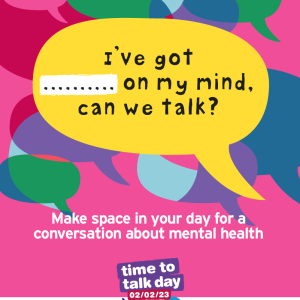
Organisations across the North East and North Cumbria are backing ‘Time to Talk Day’ on 2 February, a national campaign by charities Rethink Mental Illness and Mind, which aims to get the nation talking openly about mental health.
The annual campaign encourages people to make time to start conversations about mental health with their friends, family, colleagues and people in their communities.
Our mission is to smash the stigma surrounding mental health, self-harm and suicide. Breaking the stigma surrounding these issues could help to save lives.
Austin O’MalleySuicide prevention lead, CNTW
Austin O’Malley, suicide prevention lead at Cumbria, Northumberland, Tyne and Wear NHS Foundation Trust (CNTW), says:
“Our mission is to smash the stigma surrounding mental health, self-harm and suicide. Breaking the stigma surrounding these issues could help to save lives.
“Every time someone has the courage to speak up about how they are feeling we get one step closer to achieving this goal. It’s time for people to stop suffering in silence, it’s okay to talk about how you’re feeling, or start an open conversation if you are concerned for someone else.”
There are lots of ways to get involved in Time to Talk Day, some of the suggested actions are as simple as texting a friend you haven’t heard from in a while.
You don’t have to be an expert to chat to someone about their mental health, just giving someone space and time to share their feelings without judgment can make a huge difference.
Katherine McGleenanClinical lead for suicide prevention, CNTW
Katherine McGleenan, clinical lead for suicide prevention at CNTW, says:
“You don’t have to be an expert to chat to someone about their mental health, just giving someone space and time to share their feelings without judgment can make a huge difference.
“If someone is talking to you about their mental health, ask open questions to help you understand what they’re going though. Try to avoid giving advice unless they’ve asked directly, just listening is often the most helpful thing you can do.
“It can be really hard for people to open up about their mental health so even if they’re not prepared to talk yet, checking in with someone and letting them know you’re there for them can make it easier to start these conversations when they’re ready.
Katherine also recommends undertaking the Suicide Awareness Training (gateway mode) from the Zero Suicide Alliance. The free, online session only takes ten minutes and can help increase your confidence in starting a conversation with someone you are worried about.
The Time to Talk Day website also shares useful tips for approaching these conversations as well as resources for getting involved in Time to Talk Day activities.
People who are in distress and need urgent help can get in touch with CNTW’s Initial Response services which are open for anyone to call, 24 hours a day:
North Cumbria:
All ages – 0800 652 2865
(Text number for people who are Deaf and/or have communication difficulties – 07795 656 226)
Newcastle and Gateshead:
Adults – 0800 652 2863
Children and young people – 0800 652 2864
(Text number for people who are Deaf and/or have communication difficulties – 07919 228 548)
North Tyneside and Northumberland:
All ages – 0800 652 2861
(Text number for people who are Deaf and/or have communication difficulties – 07887 625 277)
South Tyneside and Sunderland:
Adults – 0800 652 2867
Children and young people – 0800 652 2868
(Text number for people who are Deaf and/or have communication difficulties – 07889 036 280)
If you or another person have been harmed or are at immediate risk, you may require an emergency response; contact 999 and ask for the relevant service.
Some other useful helplines are:
Samaritans – phone 116 123 or email [email protected]
CALM – an anonymous and confidential helpline & webchat, open 5pm to midnight every day, phone 0800 58 58 58 or visit www.thecalmzone.net
Shout – 24/7 crisis text support service, text 85258
Childline – phone 0800 1111 or visit www.childline.org.uk
Papyrus HopelineUK – for young people under the age of 35, call 0800 068 4141, text 07860039967, or email [email protected]
